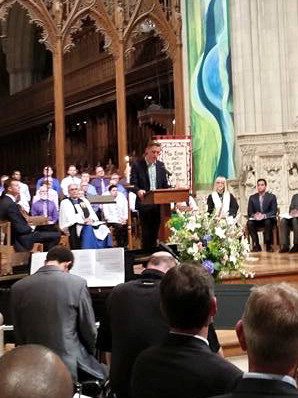Each Sunday, I take time to reflect on a sacred text, usually from the Revised Common Lectionary, in order to recalibrate, challenge, and fuel us to continue on this rough and rocky journey of faith. Today’s reading comes from Mark 12:28-34:
One of the teachers of the law came and heard them debating. Noticing that Jesus had given them a good answer, he asked him, “Of all the commandments, which is the most important?”
“The most important one,” answered Jesus, “is this: ‘Hear, O Israel: The Lord our God, the Lord is one. Love the Lord your God with all your heart and with all your soul and with all your mind and with all your strength.’ The second is this: ‘Love your neighbor as yourself.’ There is no commandment greater than these.”
“Well said, teacher,” the man replied. “You are right in saying that God is one and there is no other but him. To love him with all your heart, with all your understanding and with all your strength, and to love your neighbor as yourself is more important than all burnt offerings and sacrifices.”
When Jesus saw that he had answered wisely, he said to him, “You are not far from the kingdom of God.” And from then on no one dared ask him any more questions.
“From then on no one dared to ask him any more questions.” What could Jesus have done that caused such silence to emerge from this  antagonistic crowd of religious leaders? This is truly seems like a mic-drop moment. In an attempt to trip Jesus up, this young seminarian comes and asks Jesus what seemed to be an impossible question. Out of all of the Laws of the Hebrew Bible, which command was most important? I imagine any other religious leader would have stopped to think through what was written in the law. Could it be honoring the sabbath? Worshipping God alone? Staying away from unclean foods and people? Which commandments carried the biggest consequences? Surely, that would help us determine what is most important to God.
antagonistic crowd of religious leaders? This is truly seems like a mic-drop moment. In an attempt to trip Jesus up, this young seminarian comes and asks Jesus what seemed to be an impossible question. Out of all of the Laws of the Hebrew Bible, which command was most important? I imagine any other religious leader would have stopped to think through what was written in the law. Could it be honoring the sabbath? Worshipping God alone? Staying away from unclean foods and people? Which commandments carried the biggest consequences? Surely, that would help us determine what is most important to God.
Yet in one sentence, quickly uttered, Jesus silences all of the religious leaders of his day. “There is no commandment greater than this: love.” That was it. Love God. Love your neighbor. If you do this, you will fulfill all of the Law. In one sentence, Jesus shifts the focus from personal piety, seeking to obey every jot and tittle written in the Hebrew Bible, to a single broad principle that reshapes the rhythm of our lives than it tries to get us to obey an obnoxious laundry list of religious rules.
I was recently talking to a group of friends and we somehow stumbled onto the topic of “sin”. I voiced my critique of progressive churches, who often, in my opinion, focus so much on societal sins and systemic injustice that they neglect personal morality. I offered the exact opposite critique of conservative churches, who seem to care little for systemic injustice and instead pour all of their time into keeping God happy through acts of personal piety. Both views of sin, in my opinion, are flawed and lead us away from walking in step with the rhythm of the Kingdom. Keeping the commandments is not rigid obedience to a laundry list of rules nor engaging in activism for the sake of activism. It is living life with an ethic of love.
Each day, in every action that we do, we should shift our awareness and ask ourselves whether or not our every move is motivated by and rooted in unconditional, self sacrificial love. Love that builds up, love that heals, love that encourages, love that unifies. When we live with a broad ethic of love, we will live holy lives that are pleasing to God and beneficial to ourselves and to the world around us. When we live lives of love, we live with awareness of our interconnectedness to all things, understanding that every choice and action we make has an impact on others.
Is what I am doing today liberating, healing, blessing, and encouraging others? Is it liberating, healing, blessing, and encouraging me? If so, I can be assured that I am walking in step with the Spirit. If not, may I be empowered to repent, or turn from the path I am walking down and chose the way of love. It will not always be comfortable or favorable, and it will always cost us. But ” it is in giving that we receive; It is in pardoning that we are pardoned; It is in dying to self that we are born to eternal life.” (The Prayer of St. Francis) In the subversive, upside down Kingdom of Jesus, when we are able to live lives to the rhythm of love, we align ourselves with the Divine Flow, and we will experience righteousness, favor, and an abundance of peace. And not only us personally, but our entire world will feel the effects of the Love that flows from our lives.
This command, the command of love, silences the most legalistic of people and liberates those who are weighed down by the burden of religion. This command opens us to lives of abundance and challenges us to ask different questions about the way we live, move, and have our being in the world. The way of love is the way of life. May we realign ourselves to be people of love today.











